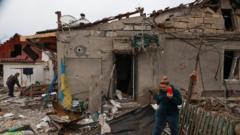As Germans cast their votes this Sunday in an unexpected snap election, they are confronted with a transformative moment for the nation and its role in Europe. This election comes on the heels of Chancellor Olaf Scholz's coalition government collapse, a situation exacerbated by political turmoil and an increasingly challenging economic landscape.
Germans Head to the Polls: Snap Election Could Shift European Dynamics

Germans Head to the Polls: Snap Election Could Shift European Dynamics
A critical snap election in Germany is poised to reshape relationships in Europe amidst rising tensions with the U.S. and Russia.
The election, originally slated for later this year, has taken on additional significance in the wake of the aggressive stance taken by the new U.S. administration under Donald Trump. There are alarming fears regarding potential tariffs impacting European countries, a lack of involvement in negotiations surrounding the Ukraine crisis, and a warming relationship with authoritarianism in Russia.
Currently, the Christian Democratic Union (CDU), led by Friedrich Merz, holds a significant lead in the polls, with the far-right Alternative for Germany (AfD) anticipated to achieve its highest electoral performance to date. This rise points to growing voter discontent with traditional parties and concerns about immigration. Meanwhile, Scholz's Social Democratic Party, in a troubling decline, risks experiencing the lowest voter support since the party was banned by the Nazis, with the Greens expected to follow closely behind.
As voters prepare to head to the polls, several key elements will be scrutinized for indications of the direction Germany might take. The political climate, shaped by economic uncertainty and evolving international relations, will make these elections one to watch closely. The stakes are high, not just for Germany but for Europe's future alignment in a rapidly shifting global context.
Currently, the Christian Democratic Union (CDU), led by Friedrich Merz, holds a significant lead in the polls, with the far-right Alternative for Germany (AfD) anticipated to achieve its highest electoral performance to date. This rise points to growing voter discontent with traditional parties and concerns about immigration. Meanwhile, Scholz's Social Democratic Party, in a troubling decline, risks experiencing the lowest voter support since the party was banned by the Nazis, with the Greens expected to follow closely behind.
As voters prepare to head to the polls, several key elements will be scrutinized for indications of the direction Germany might take. The political climate, shaped by economic uncertainty and evolving international relations, will make these elections one to watch closely. The stakes are high, not just for Germany but for Europe's future alignment in a rapidly shifting global context.






















